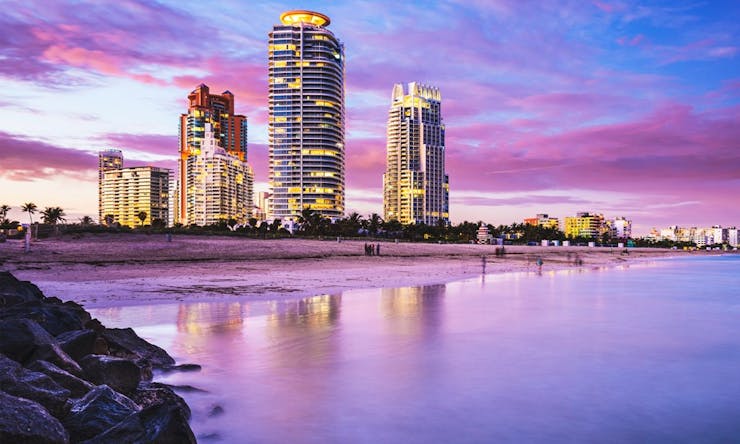Two years ago, Florida voters rejected a push to legalize medical marijuana. Well, they did and they didn’t. A sizeable majority of voters — 58 percent — agreed to legalize. But back in 2006, the state changed the rules on constitutional amendments, increasing the percentage required for passage from a simple majority to 60 percent. By failing to reach that supermajority, 2014’s medical marijuana amendment failed.
The issue is back on the statewide ballot this November, as Amendment 2, and its passage would make Florida the first Southern state to legalize marijuana in any form. Breaking that barrier in the conservative South could be a major momentum boost for the legalization movement. Will it happen? It has an excellent chance. Why now and not in 2014? It’s all a matter of timing.
Why Medical Marijuana Failed in 2014
Two years ago, Florida saw a contested race for the governor’s mansion. Rick Scott, the Republican incumbent, faced Charlie Crist, one of the state’s most eccentric politicians.


Unpopular Rick Scott and more unpopular Charlie Crist
Crist had previously served as governor from 2007 to 2011. He was a Republican when in office, but after a stint at a personal injury law firm and an endorsement of Barack Obama for president, he decided to switch over and become a Democrat. Though Scott was fairly unpopular, Crist found a way to lose to him. The unloved eccentric lost to the disliked conservative by a single point, 48.1 percent to 47.1 percent. You might think a race with such colorful characters and relatively high stakes would drive significant voter turnout. You would be wrong. While Florida’s voter participation for the presidential election in 2012 crossed 70 percent, the numbers in the 2014 elections hovered in the low 40s. It turns out that when you run two unpopular politicians against each other, the whole election turns into a no-show. Or at least a low-show.
What did low voter turnout for the gubernatorial race have to do with Amendment 2? A lot. Typically, a low turnout means only the most consistent voters make up the electorate. In Florida those voters are typically older, more conservative, and far less receptive to marijuana legalization. In presidential years, the electorate is significantly younger and more liberal, meaning marijuana legalization would presumably stand a better chance of passing. Even in a low-turnout year, as 2014 was, Amendment 2 only missed the threshold for passage in Florida by 2 percent. If the electorate had been younger, the amendment likely would have reached a supermajority and passed.
Why Medical Can Pass in 2016
In 2016, Florida will likely have voter turnout rates closer to 2012’s 71 percent than 2014’s 43 percent. High voter turnout would likely result in Florida legalizing medical marijuana, and becoming the first Southern state to do so.
It’s not just about the under-30 voter, either. Young voters are a driving force behind marijuana legalization, but they aren’t the only force. Cannabis use has become normalized across much of the nation, and local decriminalization movements have made real progress in Florida. Miami Beach, Miami–Dade County, Hallandale Beach, Key West, Volusia County, and Broward County are just a few of the Floridia localities that have moved to decriminalize possession of 20 grams or less. In most cases, such possession carries only a $100 civil fine, not an arrest or jail time. Decriminalization has helped to normalize marijuana and make its usage more mainstream and less taboo.
Words also matter. Florida’s 2016 medical marijuana measure contains some critical language that differs from that of its 2014 predecessor. The 2016 amendment clarifies that legalization is for “debilitating” illnesses, and that minors would not be able to obtain medical marijuana without parental consent. It contains limits on how many patients a caregiver can treat, and it says doctors would not be immune from marijuana-related malpractice claims. While these clarifications might seem minor, they could serve to alleviate the fears of moderate Floridians who are on the fence about medical marijuana legalization.
Is There a Next Step? From Medical to Recreational
Passing Amendment 2 would be a significant win for legalization advocates. But for some it won’t be enough. There will continue to be a push to legalize for everyone 21 and older. Can Florida go from legalizing medical to legalizing recreational?
Possibly — if the state follows the road maps established by Washington, Colorado, and Oregon. A medical marijuana win in 2016 could help normalize marijuana use and eventually bring decriminalization to the central and northern parts of Florida, which are much more conservative than southern counties such as Broward and Miami–Dade. Legalization advocates should continue to use presidential elections as springboards. In Florida, that likely means avoiding 2018 and 2022, focusing instead on 2020 and 2024.
For now, medical marijuana has a good chance at becoming legal in Florida in the 2016 election. Washington and Colorado waited 14 and 12 years, respectively, between the adoption of medical marijuana and the passage of full adult use. As the nation normalizes its relationship with cannabis, maybe Florida won’t have to wait that long.
Image Sources: Joe Skipper via Reuters and Wikimedia Commons










